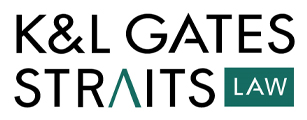Singapore has established itself as a global business hub, ranking first in Asia and fourth worldwide in global competitiveness according to the IMD World Competitiveness Ranking and second for Ease of Doing Business according to the World Bank in 2023. Such high performance has been supported by a multitude of factors that include Singapore’s political and operational stability, sound rule of law and policy-making transparency, the lowest corruption levels in the Asia-Pacific and a highly educated and trained workforce.
Singapore is well positioned as a gateway into the Asian and Southeast Asian (SEA) markets given its geographical advantage, housing 46% of the Asia regional headquarters of many multinational corporations, such as Johnson & Johnson, Mastercard, Pfizer and Schneider Electric.
SETTING UP A BUSINESS

Partner
K&L Gates Straits Law
Tel: +65 6507 8110
Email: christopher.tan@klgates.com
A brief overview on the common forms of business entities incorporated in Singapore to carry out investment activities is set out as follows:
1. Private Limited Company. Incorporation of a private company limited by shares is a straightforward process which, on the lodgement of the necessary documents and satisfaction of key requirements, is usually completed within one to two business days by the Accounting and Corporate Regulatory Authority (ACRA), provided that no complications arise.
2. Limited Partnership (LP). An LP consists of a minimum of two partners, with at least one general partner and one limited partner. As a Singapore LP does not have a separate legal personality from its partners, it is the general partner that enters into contracts, holds assets and is responsible for the day-to-day management on the LP’s behalf. Further, the general partner is liable for all the debts and obligations of the LP during his/her tenure, whereas limited partners are only liable for the agreed amount of their contributions.
3. Variable Capital Company (VCC). The VCC framework was launched in 2020 as a new corporate structure that can be used for a wide range of investment funds and provides fund managers with greater operational flexibility and cost savings.
The VCC Grant Scheme has been extended with effect from January 2023 for two years, from 16 January 2023 to 15 January 2025 (both dates inclusive) whereby the Financial Sector Development Fund will co-fund 30% of the qualifying expenses for qualifying work in Singapore to the maximum cap of SGD30,000 (USD21,900) per application.
LICENSING AND REGULATORY

Partner
K&L Gates Straits Law
Tel: +65 6507 8183
Email: henry.kim@klgates.com
1. Capital market service licence considerations. Investment activities may be subject to licensing and other regulatory considerations under the Securities and Futures Act 2001 of Singapore (SFA). The SFA provides that the carrying out of certain activities specified in its Second Schedule – including (i) dealing in capital markets products (CMP); and (ii) fund management – are regulated (unless otherwise exempted). In the case where a business envisages carrying out such regulated activities, it must be registered with the Monetary Authority of Singapore (MAS) or hold a capital market services (or CMS) licence to carry out the relevant regulated activities.
2. Offering of securities and fund units. Offerings of securities and units of collective investment schemes (CIS) are regulated pursuant to divisions 1 and 2 of part XIII of the SFA, respectively. For both offerings, unless an exemption applies, the offer must be made in or accompanied by an MAS-registered prospectus and product highlights sheet (prospectus requirement).
Further, in the case of offers of units in a CIS, the relevant CIS must be authorised or recognised by the MAS. This applies unless the scheme is regarded as a restricted scheme, meaning a scheme offered only to “relevant persons” (as defined under the SFA, essentially being accredited and institutional investors), or at a minimum of SGD200,000 per transaction.
3. Family offices. Singapore has become a favoured destination for asset management activities of high net-worth individuals, ranking second in the Deloitte International Wealth Management Centre Ranking 2021, with more than 1,100 family offices as at the end of 2022.
Family offices may be set up either as: (i) a single-family office (SFO) that manages assets held solely by one family; or (ii) a multiple-family office (MFO) that manages third-party assets of two or more families. Whereas MFOs are subject to licensing requirements under the SFA for fund management, SFOs may rely on the available class exemption from licensing where the SFO manages funds only for its related persons.
TAX INCENTIVES
Singapore’s attractive tax incentives and business-friendly tax regimes bolster interest in carrying out investment in and through Singapore. These incentives include a low corporate tax rate at 17% and no capital gains tax imposed on the sale of property, shares and other financial instruments. Singapore has also entered into a network of double-tax treaties, including with South Korea.
FUND-SPECIFIC TAX INCENTIVES
Specified income derived from designated investments from funds managed by fund managers in Singapore may be tax exempt in accordance with the Income Tax Act 1947 (ITA) and its subsidiary legislation. Designated investments include assets such as shares and debt securities. The fund must apply to the MAS, and to the Inland Revenue Authority of Singapore, to avail exemptions for which it is eligible.
SECTOR-BASED FOCUS

Partner
K&L Gates Straits Law
Tel: +65 6507 8109
Email: edward.bennett@klgates.com
1. Singapore’s research, innovation and enterprise 2025 plan (RIE2025). RIE2025 aims to create avenues of growth and raise Singapore’s economic competitiveness during the period from 2021 to 2025.
It focuses on four strategic domains where the government will sustain investment of about 1% of GDP (about SGD25 billion): (i) manufacturing, trade and connectivity (MTC); (ii) human health and potential (HHP); (iii) urban solutions and sustainability (USS); and (iv) smart nation and digital economy (SNDE).
In 2022, the MTC domain saw increased investment with deal volume rising by 36% and value by 15%. Conversely, the HHP domain experienced lower investor appetite along with the post-covid return to normalcy in daily activities. The USS domain had a 60% fall in deal volume but saw deal value almost double, while SNDE improved in 2022 with total deal value increasing by 3% year-on-year to USD9.04 billion.
2. Fintech. Singapore’s investment into fintech has been active with more than 1,300 fintech firms and 50 innovations labs set up in Singapore with a record-high USD4.1 billion investment being reached in 2022. The MAS had announced the Financial Sector Technology and Innovation Scheme, which is an enhanced grant scheme of a SGD150 million commitment from July 2023 to March 2026.
3. Cryptocurrency. Singapore as a crypto hub has been growing. Broadly speaking, the carrying out of certain business activities involving crypto assets in Singapore may be subject to regulation and licensing requirements. Should the crypto asset be considered as a CMP, dealing with assets such as brokering a sale and purchase of a security token may be a regulated activity pursuant to the SFA. Further, if the crypto asset falls under the scope of a digital payment token (DPT) defined in the Payment Services Act 2019, the provision of services in dealing with these DPTs may require a payment services licence.
In light of recent disruptions in the cryptocurrency space with the Terra stablecoin, Three Arrows Capital, and FTX debacles, the MAS has given greater attention to regulating crypto-related services with an emphasis on safeguarding retail investors.
4. Sustainable finance. In 2020, the share of management assets with environmental, social and governance (ESG) focus was 33% of Singapore’s total assets under management that year. As part of the Green Finance Action Plan 2019, the MAS launched the USD2 billion Green Investments Programme to catalyse environment-focused public market investment strategies.
As a general strategy, the Singapore Green Plan 2030 additionally sets out milestones for sustainable development. Targets include a 1.5GW peak of solar power deployment by 2025.
5. Bio-technology. Singapore has been leading as a biomedical science and technology hub, with companies such as GlaxoSmithKline, MSD and Roche establishing their commercial operations, and Pfizer, Novartis, Sanofi, AbbeVie and Amgen having their global manufacturing hubs in Singapore. Innovation efforts have further been spearheaded with SGD4 billion in a public-sector research funding commitment to the health and biomedical sciences domain.
CLOSING REMARKS
Singapore’s investment outlook remains resilient despite the challenging macroeconomic environment of rising inflation and tightening global monetary policies. The economic infrastructure and reputation that Singapore has built for being stable, reliable and neutral serves to encourage diverse sourcing of quality funds from the US, Europe and Asia, with growing interest from businesses in China and Northeast Asia.

9 Raffles Place, 32-00 Republic Plaza,
Singapore 048619
Tel: +65 6713 0200
Contact person:
Sreenivasan Narayanan SC
Managing Partner
Tel: +65 6713 0234
Email: sreeni.narayanan@klgates.com
https://www.klgates.com/




























